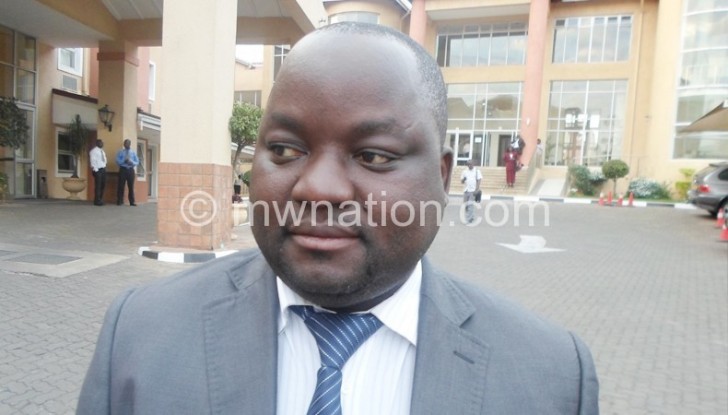‘Govt is committed to financing needy students’
Recently, the Higher Education Students Loans and Grants Board has come under fire on the identification of students loans beneficiaries. ALBERT SHARRA caught up with the board’s executive director Chris Chisoni to explain the procedures and plans underway.

Q:
There are concerns from the public with the identification of beneficiaries for students’ loans in public universities, with some arguing that students that are capable of paying their own fees are benefiting at the expense of needy students. How do you explain this?
A:
The board uses data provided by students that apply for the loans. In the last academic year, there was no other way, in the absence of engaging the various university administrators, that the board would have known otherwise. However, such cases were minimal and they did not greatly affect the percentage of the actual needy and deserving students.
Once such minor cases were identified, the undeserving students were removed from the beneficiaries list. Now the board’s secretariat is operational with proper systems and procedures put in place to effectively screen and identify needy and deserving students.
Q:
What criteria does your office use to identify these beneficiaries?
A:
The loan application form is detailed to capture the demographic, economic and financial status of each applicant. The screening, as of 2015/16 financial year, was done based on such data provided by the applying students. However, noting the few cases of undeserving students accessing the loans, we realised that some falsified their information.
We have, therefore, changed the loan form to add a few more steps of verification and vetting jointly with university administrators and deans of students as well as parents.
Q:
When is the new system of identifying beneficiaries starting?
A:
This system is starting now. Loan application forms will be sent to colleges and universities and district education managers’ [DEM] offices across the country in April. Thereafter, a screening process will commence followed by a vetting process. It is after the vetting processes at two different levels that the proposed list of needy students will be presented to the board for approval. We are also capturing data of needy students in their Form Three and Four at secondary schools which we will be kept in our data bank ready for use once such students are selected to universities. That is what links us as Higher Education Students Loans and Grants Board [HESLGB] and National Council for Higher Education [NCHE].
Q:
Why should Malawians trust this system?
A:
Before the establishment of the board and before Parliament put in place the Act regulating the operations of such an entity, it would have been very easy not to trust anything. However, we have a robust board and legal framework in place with clear lines of answerability and accountability to the Ministry of Education and Parliament. We have the systems and structures and offices put in place, hence, Malawians must trust us and celebrate that government has committed itself to finance needy and deserving students in an orderly manner just like it will, through our board, recover the preceding loans from former beneficiaries.
Q
: Reports indicate that some students from Chancellor College and other public colleges dropped out after being left out on the students’ list approved for the loans this academic year and this defeats the whole purpose of the students loans programme. What do you say?
A:
The loan application process is annual as such let them to re-apply for the 2016/17 loans. The limiting factor in 2015/16 financial year was the budget and the board in turn has intensified its loans recovery processes so that it can access more funds in addition to what government will provide in 2016/17 budget. It is also critical to remember that our mandate now goes beyond public universities into private universities as well so the demand is too high hence a need for students to be realistic on their expectations and demands.
Q:
You have embarked on a campaign to recover loans from all former beneficiaries of the loans. How many owes government and how much do you plan to collect this financial year?
A:
The Act tells us to start from 1985/86 financial year and this process to track former beneficiaries is ongoing. However, we know of the current data we have from 2000 to 2012 that K 1.7 billion is due for recovery. In this year alone, we expect, with the positive responses we are getting to collect up to K700 million.
Q:
Some are arguing that your office has no sufficient documents to trace these people, hence just asking them to come forward. What mechanisms are there to ensure everyone is traced and pays back the loans?
A:
Malawians should trust us that we do have the data. We are also tracking the oldest data way back to 1985. As we make the special appeal for repayment of the loans, it is our strategy. We have many strategies put in place to track and recover the former loans. In any case, it is a matter of principle that if one got a loan he/she must pay back. There are more deserving students who need the finances to access higher education. Our responsibilities, therefore, in tracking former beneficiaries are multifaceted and we will be utilising them at each given context and scenario arising.
Q:
Any additional comment?
No one should doubt [the board’s capacity]. We appeal to those that have loans already matured to pay and we will in turn be empowered to support more needy and deserving students. It is a national duty and we must all support this board by even funding it privately so that government is supported in its efforts to provide finances for higher education, a critical need for Malawi’s socio-economic and political transformation. n





